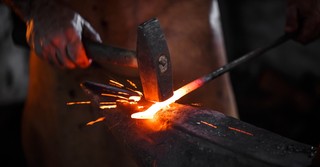
- Recent Translations
- All Translations
Malachi 3:2
Share
Settings
Malachi 3:2 in Other Translations
Malachi 3:2 Meaning and Commentary
But who may abide the day of his coming?
&c.] When he should be manifest in Israel, and come preaching the Gospel of the kingdom; who could bear the doctrines delivered by him, concerning his deity and equality with God the Father; concerning his character and mission as the Messiah, and his kingdom not being a temporal, but a spiritual one; concerning his giving his flesh for the life of the world, and eating that by faith; concerning distinguishing and efficacious grace; and all such that so severely struck at the wickedness of the Scribes and Pharisees, and their self-righteous principles; and especially since for judgment he came, that they might not see? nor could they bear the light of this glorious Sun of righteousness; and he came not to send peace and outward prosperity to the Jews, but a sword and division, ( John 9:39 ) ( Matthew 10:34 ) ( Luke 12:51 ) very few indeed could bear his ministry, or the light of that day, it being so directly contrary to their principles and practices: and who shall stand when he appeareth?
in his kingdom and glory, to take vengeance on the Jews for their rejection of him and his Gospel; for this coming and appearance of his include all the time between his manifestation in the flesh and the destruction of Jerusalem; and so all those sorrows and distresses which went before it, or attended it, and were such as had never been from the creation of the world; and unless those times had been shortened, no flesh could have been saved; see ( Matthew 24:3-22 ) ( Luke 21:36 ) : for he [is] like a refiner's fire;
partly by the ministry of the word, compared to fire, ( Jeremiah 23:29 ) separating pure doctrines from ones of dross; and partly by his fiery dispensations and judgments on the wicked Jews, when he distinguished and saved his own people from that untoward generation, and destroyed them: and like fuller's soap;
or "fuller's herb", as the Septuagint and Vulgate Latin versions render it, and Jarchi interprets it: and so R. Jonah F19 interprets it of an herb which fullers use: and in the Misna
F20 this is one of the seven things used to take out spots, namely, "borith", the word here used; and which Maimonides F21 says is a plant known by the name of "algasul" and "gazul" in the Arabic language: it signifies something by which filth is washed away; and so Bartenora F23 says it is a plant which purifies and cleanses; and Jerom F24 relates that this herb grows in Palestine, in moist and green places, and has the same virtue as nitre to take away filth; agreeably to which some other versions render it "fuller's weed", or "soap weed" F25. The Syriac version is,
``as sulphur that makes white;''and fullers, with the Romans, were wont to make use of that along with chalk to take out spots; and so Pliny F26 speaks of a kind of sulphur which fullers make use of. A metaphor signifying the same thing as before, the removing of spotted doctrines or spotted persons, the one by the preaching of the Gospel, the other by awful judgments, as spots in garments are removed by the fuller's herb or soap.
F19 Apud Kimchi in Sepher Shorash. rad. (rrb) .
F20 Niddah. c. 9. sect. 6.
F21 In Misn. ib.
F23 In ib.
F24 Comment. in Jer. ii. 22.
F25 (Myobkm tyrbk) "ut lanaria fullonum", Drusius; "radicula, [vel] saponaria", Vatablus.
F26 Nat. Hist. l. 35. c. 15.

